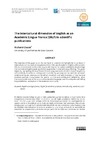Identificador persistente para citar o vincular este elemento:
https://accedacris.ulpgc.es/jspui/handle/10553/70381
| Campo DC | Valor | idioma |
|---|---|---|
| dc.contributor.author | Clouet, Richard | - |
| dc.date.accessioned | 2020-02-19T18:12:21Z | - |
| dc.date.available | 2020-02-19T18:12:21Z | - |
| dc.date.issued | 2017 | - |
| dc.identifier.issn | 1133-1127 | - |
| dc.identifier.other | WoS | - |
| dc.identifier.uri | https://accedacris.ulpgc.es/handle/10553/70381 | - |
| dc.description.abstract | The objective of this paper is, on the one hand, to present and highlight the importance of intercultural communicative competence (ICC) in the use of academic English within a scientific environment and, on the other, to provide insights into understanding the disadvantage that non-native English-speaking scholars experience in international publishing.This paper begins by highlighting the importance of developing awareness of intercultural competency and sensitivity in academic writing and concludes by pointing out the need for increased understanding and tolerance on behalf of the editors and peer-reviewers of international academic journals. It emphasizes the need to promote acceptability and intelligibility, rather than mere conformity to the norms of the standard language, and it humbly aims at shifting long-established perceptions in the academic community. | - |
| dc.description.abstract | El objetivo de este trabajo es, por un lado, presentar y poner de relieve la importancia de la competencia comunicativa intercultural en el uso de inglés académico dentro de un entorno científico y, por otro, indagar sobre las desventajas que tienen los investigadores no nativos a la hora de publicar sus artículos en inglés en revistas internacionales. Este artículo empieza por subrayar la importancia del desarrollo de una conciencia comunicativa y una sensibilidad intercultural en el entorno académico y concluye señalando la necesidad de aumentar la comprensión y la tolerancia por parte de los editores y revisores de revistas académicas internacionales. Se hace hincapié en la necesidad de promover los conceptos de aceptación e inteligibilidad, en lugar de la simple conformidad con las normas de la lengua estándar, y se pretende cambiar ciertas las percepciones establecidas desde hace tiempo en la comunidad académica. | - |
| dc.language | eng | - |
| dc.relation.ispartof | LFE. Revista de Lenguas para Fines Específicos | - |
| dc.source | LFE. Revista de lenguas para fines específicos [eISSN 2340-8561], v. 23 (2), p. 313-333 | - |
| dc.subject | 570107 Lengua y literatura | - |
| dc.subject | 550510 Filología | - |
| dc.subject.other | English as a lingua franca | - |
| dc.subject.other | English for academic purposes | - |
| dc.subject.other | Interculturality | - |
| dc.subject.other | Academia | - |
| dc.subject.other | Publications | - |
| dc.subject.other | Inglés como lingua franca | - |
| dc.subject.other | Inglés para fines académicos | - |
| dc.subject.other | Interculturalidad | - |
| dc.title | The Intercultural Dimension of English as an Academic Lingua Franca (EALF) in Scientific Publications | - |
| dc.type | info:eu-repo/semantics/article | - |
| dc.type | Article | - |
| dc.identifier.doi | 10.20420/rlfe.2017.184 | - |
| dc.identifier.isi | 000417438500015 | - |
| dc.identifier.eissn | 2340-8561 | - |
| dc.description.lastpage | 333 | - |
| dc.identifier.issue | 2 | - |
| dc.description.firstpage | 313 | - |
| dc.relation.volume | 23 | - |
| dc.investigacion | Artes y Humanidades | - |
| dc.type2 | Artículo | - |
| dc.contributor.daisngid | 3625961 | - |
| dc.description.numberofpages | 21 | - |
| dc.contributor.wosstandard | WOS:Clouet, R | - |
| dc.date.coverdate | 2017 | - |
| dc.identifier.ulpgc | Sí | es |
| dc.description.esci | ESCI | |
| dc.description.dialnetimpact | 0,0 | |
| dc.description.dialnetq | Q3 | |
| dc.description.dialnetd | D6 | |
| dc.description.erihplus | ERIH PLUS | |
| item.grantfulltext | open | - |
| item.fulltext | Con texto completo | - |
| crisitem.author.dept | GIR Traducción e Interpretación, Interculturalidad, Lenguas Aplicadas y Literatura de Viajes | - |
| crisitem.author.dept | Departamento de Filología Moderna, Traducción e Interpretación | - |
| crisitem.author.orcid | 0000-0003-0727-1260 | - |
| crisitem.author.parentorg | Departamento de Filología Moderna, Traducción e Interpretación | - |
| crisitem.author.fullName | Clouet, Richard | - |
| Colección: | Artículos | |
Citas de WEB OF SCIENCETM
Citations
5
actualizado el 25-feb-2024
Visitas
60
actualizado el 10-ene-2026
Descargas
59
actualizado el 10-ene-2026
Google ScholarTM
Verifica
Altmetric
Comparte
Exporta metadatos
Los elementos en ULPGC accedaCRIS están protegidos por derechos de autor con todos los derechos reservados, a menos que se indique lo contrario.
